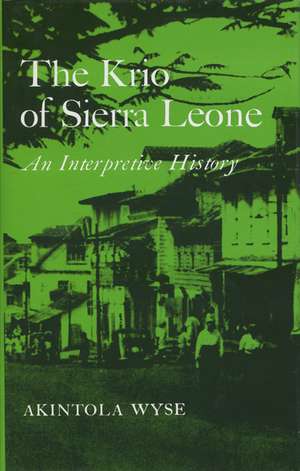Wyse, A: The Krio of Sierra Leone
Autor Akintola J.G. Wyseen Limba Engleză Hardback – 14 sep 1989
The Krio of Sierra Leone—often erroneously called ‘Creole’—are a people with a unique tradition and history. Their ancestors, the first colonists of the Peninsula on which Freetown stands, were black people brought to Africa from London, Nova Scotia and Jamaica, and ‘Liberated Africans’ freed from slave ships intercepted on their way to the Americas. Never a large group, the Krio people were at first favored subjects of the colonial rulers, and received the full force of the evangelistic and educational outreach of the English-based missionary societies. Soon they had produced an elite echelon of professionals, academics, clergymen and business entrepreneurs very much in the white man’s image. The middle and late nineteenth century was their heyday.
Wyse has set out to interpret the history of the Krio from their earliest days as a collective entity to the present, to chart the graph of their rise and decline as a political force, and to examine the characteristic ethos of the people as expressed in their social, economic and above all educational aspirations, and in the careers of leading political and intellectual figures. The important role of the humbler Krio traders and market women in financing the education of their offspring in each generation is stressed, and the author meets the often-voiced criticism of the Krio head-on by frankly examining the weaknesses of his people, along with their strengths.
Wyse has set out to interpret the history of the Krio from their earliest days as a collective entity to the present, to chart the graph of their rise and decline as a political force, and to examine the characteristic ethos of the people as expressed in their social, economic and above all educational aspirations, and in the careers of leading political and intellectual figures. The important role of the humbler Krio traders and market women in financing the education of their offspring in each generation is stressed, and the author meets the often-voiced criticism of the Krio head-on by frankly examining the weaknesses of his people, along with their strengths.
Preț: 383.57 lei
Preț vechi: 461.34 lei
-17% Nou
Puncte Express: 575
Preț estimativ în valută:
73.40€ • 78.49$ • 61.20£
73.40€ • 78.49$ • 61.20£
Carte tipărită la comandă
Livrare economică 17-23 aprilie
Preluare comenzi: 021 569.72.76
Specificații
ISBN-13: 9781850650317
ISBN-10: 1850650314
Pagini: 156
Ilustrații: maps
Dimensiuni: 138 x 216 mm
Greutate: 0.33 kg
Editura: C Hurst & Co Publishers Ltd
ISBN-10: 1850650314
Pagini: 156
Ilustrații: maps
Dimensiuni: 138 x 216 mm
Greutate: 0.33 kg
Editura: C Hurst & Co Publishers Ltd
Notă biografică
Akintola Wyse is associate professor and head of the department of history at Fourah Bay College.
Descriere
The Krio of Sierra Leone—often erroneously called ‘Creole’—are a people with a unique tradition and history. Their ancestors, the first colonists of the Peninsula on which Freetown stands, were black people brought to Africa from London, Nova Scotia and Jamaica, and ‘Liberated Africans’ freed from slave ships intercepted on their way to the Americas. Never a large group, the Krio people were at first favored subjects of the colonial rulers, and received the full force of the evangelistic and educational outreach of the English-based missionary societies. Soon they had produced an elite echelon of professionals, academics, clergymen and business entrepreneurs very much in the white man’s image. The middle and late nineteenth century was their heyday.
Wyse has set out to interpret the history of the Krio from their earliest days as a collective entity to the present, to chart the graph of their rise and decline as a political force, and to examine the characteristic ethos of the people as expressed in their social, economic and above all educational aspirations, and in the careers of leading political and intellectual figures. The important role of the humbler Krio traders and market women in financing the education of their offspring in each generation is stressed, and the author meets the often-voiced criticism of the Krio head-on by frankly examining the weaknesses of his people, along with their strengths.
Wyse has set out to interpret the history of the Krio from their earliest days as a collective entity to the present, to chart the graph of their rise and decline as a political force, and to examine the characteristic ethos of the people as expressed in their social, economic and above all educational aspirations, and in the careers of leading political and intellectual figures. The important role of the humbler Krio traders and market women in financing the education of their offspring in each generation is stressed, and the author meets the often-voiced criticism of the Krio head-on by frankly examining the weaknesses of his people, along with their strengths.
